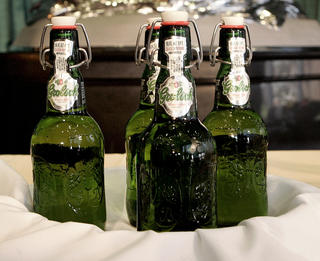Japan’s Asahi Group Holdings is diving into Europe in hopes of instantly enlarging its presence in an ever-consolidating global beer market.
 The purveyor of Super Dry has offered to buy not one but four brewers and beer distributors owned by SABMiller for a total of 2.55 billion euros ($2.85 billion), it said on Wednesday.
The purveyor of Super Dry has offered to buy not one but four brewers and beer distributors owned by SABMiller for a total of 2.55 billion euros ($2.85 billion), it said on Wednesday.
The deal would see the makers of Peroni and Grolsch, based in Italy and the Netherlands, respectively, as well as London craft house Meantime Brewing and U.K. distributor Miller Brands go under Japanese ownership.
The sale is conditional on the completion of SABMiller’s takeover by Anheuser-Busch InBev, the world’s biggest beer company. Asahi seeks to negotiate a final agreement with InBev by summer and complete the transaction this year.
The Japanese brewer’s foreign acquisitions have hitherto been concentrated in the Asia-Pacific region. Few have been as large as those made by Kirin Holdings and other domestic rivals seeking overseas growth. As a result, Asahi depends on the home market for nearly 90% of its earnings. With a global market share of just 1.2%, the company ranks 10th and risks becoming a perpetual underdog as the industry realigns.
Asahi is now reaching for a pair of venerable European brands to add some depth to the foreign side of its business. The continued success of Super Dry in Japan helps finance the acquisition, the biggest by a Japanese brewer since Kirin made Brazil’s Schincariol wholly owned in 2011.
As a relative latecomer among Japanese brewers to the race for global market share, Asahi was drawn to the European market’s stability and wide profit margins. Birra Peroni and Royal Grolsch have loyal followings. The size of Asahi’s offer attests to the value it sees in both brewers’ brands.
“The attraction was in the brands’ local penetration,” a senior Asahi executive said of the company’s bid.
Peroni ranked as the top-selling brand in Italy in 2014, with a 17.4% share, Euromonitor said. It has extended its lead to more than double the sales of the No. 2 and No. 3 brands. Besides its light namesake brew, Birra Peroni offers the stronger Peroni Forte and Nastro Azzurro, which sells widely at cafes and restaurants.
With an emphasis on detail, Royal Grolsch has carved out a place in a Dutch market dominated by local-brew-turned-global-name Heineken. Grolsch, the third-ranked brand in the Netherlands, according to Euromonitor, is on the heavy side and rather bitter compared with the typical lager. It is sold in distinctive flip-top bottles in supermarkets and other retailers across Europe.
What the European beer market lacks in growth prospects compared with emerging economies it makes up for in size, at one-quarter of the global total, and high unit prices. There is less risk of becoming trapped in a race to the bottom in prices. Given the established market shares of Peroni and Grolsch, Asahi expects stable cash flows. It also will seek to tap local vendor networks to sell Super Dry in Europe, generating additional growth.
But rival Kirin can attest to the difficulty of making acquisitions pay off. Schincariol, now known as Brasil Kirin, has underperformed, resulting in a roughly 114 billion yen ($999 million) extraordinary loss last fiscal year, despite Kirin spending around 300 billion yen in the 2011 buyout.
Europe is farther from Asahi’s oversight than its Australia-based Oceania business and has a vastly different corporate culture, presenting a challenge for management.

